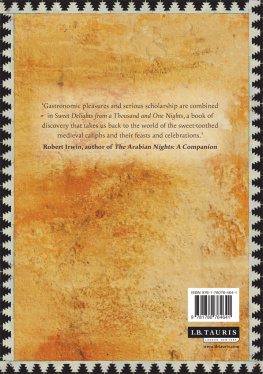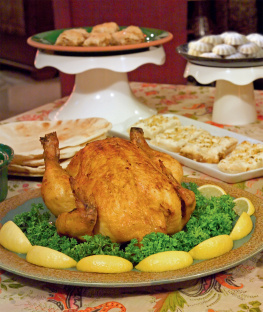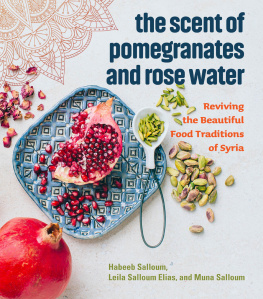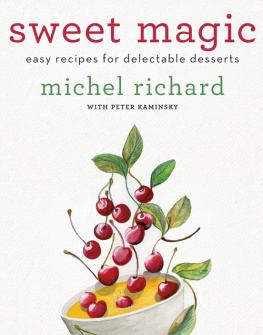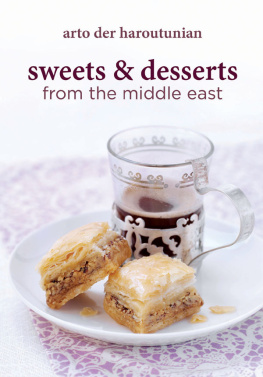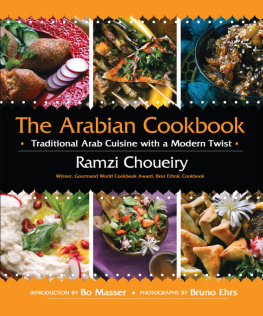Habeeb Salloum is a freelancewriter and author. He has written severalbooks, including Arabic Contributions tothe English Vocabulary and Journeys Back toArab Spain, in addition to five cookbooksthat deal with Arab cuisine.
Muna Salloum is a freelance writerand author. She holds an MA in MiddleEast and Islamic Studies from theUniversity of Toronto, specializing in thesocio-economic history of the Arabs inSpain. She is the author of The Sweets ofAraby, co-authored by Leila Salloum Elias.
Leila Salloum Elias is a freelancewriter and author. She holds an MA inMiddle East and Islamic Studies fromthe University of Toronto, specializingin Arabic literature in Arab Spain andthe story of the early Arab immigrants tothe US. She too is the author of severalbooks, including The Sweets of Araby,co-authored by Muna Salloum.
Habeeb, Muna and Leila have alsoco-authored a forthcoming book titledMedieval Delights from the Arabian Nights:Recreating the Kitchen of the Medieval Arabs.
We dedicate this book to Freda Abu Rizk (Bourzk) Salloum
Wife of Habeeb and mother of Muna and Leila, she was the person who convinced us to write about the history of Arab sweets, one of her favourite subjects. Her love for and pride in her origins inspired her daughters to learn from her and to transcribe what she found best in Arab cuisine. Freda believed in continuing the traditions of old Damascus, for it was she who learned from her mother the continuity of her familys cooking techniques, their secrets and their flavours. Unexpectedly, she left us, but her spirit remains within as we continue what she loved. It was Freda, or Sitty, who urged us to dedicate this book to her precious grandchildren, the sweets of her life, Laith, Mazin, Jinaan and Shaadi, and to her great-grandsons, Bilal and Tamer, who were to be born after her passing. For it was Freda who said, For the love of their heritage and with our past, we give you our future to pass on.

Published in 2013 by I.B.Tauris & Co. Ltd
6 Salem Road, London W2 4BU
175 Fifth Avenue, New York NY 10010
www.ibtauris.com
Distributed in the United States and Canada Exclusively by
Palgrave Macmillan, 175 Fifth Avenue, New York NY 10010
Copyright 2013 Habeeb Salloum, Muna Salloum and Leila Salloum Elias
The right of Habeeb Salloum, Muna Salloum and Leila Salloum Elias to be identified as the authors of this work has been asserted by them in accordance with the Copyright, Designs and Patents Act 1988.
All rights reserved. Except for brief quotations in a review, this book, or any part thereof, may not be reproduced, stored in or introduced into a retrieval system, or transmitted, in any form or by any means, electronic, mechanical, photocopying, recording or otherwise, without the prior written permission of the publisher.
ISBN: 978 1 78076 464 1
eISBN: 978 0 85773 341 2
A full CIP record for this book is available from the British Library
A full CIP record is available from the Library of Congress
Library of Congress Catalog Card Number: available
Designed and typeset by Dexter Haven Associates Ltd, London
List of plates
al-Sanbusak al-Hulu
Isfunj
Kunafa
Kunafa (rolled)
Mushash Zubayda
Lawzinaj
Mhansha
Muhajirin Cannoli
Qarmush
Qataif Mahshi
Irnin
Klaycha
Kak Suri
Kak bi Halib
Kak Mahshi
Maqrud
Nuhud al-Adhra
Biscochitos
Faludhaj
Natif
Soplillos
Torta Imperial
Makshufa
Sabuniya
Arnad de Carabassa
Basisa
Dimagh al-Mutawakkil
Balouza
Muhallabiya
Hays
Jawadhib al-Mawz
Juraydat

Every meal without a sweet is an imperfection.
(al-Raghib al-Asbahani II 62021)
Acknowledgements
Working on these recipes from the medieval period of Arab history has been an exciting and adventurous challenge. They have been a source of great pleasure and discussion in our household and among friends, family and colleagues.
Our special thanks to Issam for his assistance in explaining certain nuances in specific Arabic phrases; to Laith, Mazin, Jinaan and Shaadi for their patience in taking many of the photographs, their taste-testing and their comments about many of the desserts; and to Yusuf and Aida for spending hours with the authors endlessly re-reading ambiguous passages in classical and medieval Arabic literature. Their interest was worth the effort, done with compassion for and pride in the heritage of their ancestors.
Our gratitude also goes out to Nawal Nasrallah, who clarified some terms from al-Warraqs Kitab al-Tabikh, and to Charles Perry for providing us with his unpublished translation of Ibn Jazlahs Minhaj al-Bayan, based upon the British Librarys manuscript.
Moreover, we acknowledge the University of Toronto and Penn State University library staff for their assistance in obtaining research materials off campus, essential to this study.
And then, of course, there are our friends, colleagues and neighbours who, without hesitation, volunteered to try our adaptations of the medieval sweets. Some even deserve special mention for their readiness to drop by to try a sweet or two or three or to decipher a troublesome old-country mode of preparation.
To all we express our thanks for the tremendous encouragement to complete this project in order to expose the rich culinary history of Arab sweets.
However, most importantly, we thank the writers of these medieval Arabic cookbooks for recording for us what they thought best in their times.
Glossary
Baqlawa | A sweet made of filo pastry sheets with a nut filling and covered with a flavoured sugar-based syrup. |
daniq | A measure, equal to one-sixth of a dirham, or approximately half a gram. |
dibs rumman | Pomegranate syrup, available in Middle Eastern and Mediterranean grocery outlets. |
dinar | A measure, equal to between two-thirds and one teaspoon; also called mithqal (in the eastern Arab world between 4 and 4g; in al-Andalus, 5g). |
dirham | A measure, equal to six daniq, or half to three-quarters of a teaspoon (in the eastern Arab world, approximately 3g; in al-Andalus, a little under 4g). |
Faludhaj | A sweet and rich pudding or candy. |
filo pastry | In the Arab East, filo is called Baqlawa dough, a paper-thin dough that originated in the Middle East, where it is a popular base for pastries. Filo pastry is typically sold frozen in one-pound packages in the frozen-food section of supermarkets and Mediterranean and Middle Eastern markets. Before use the box of filo pastry should be defrosted in a refrigerator overnight for about eight hours and then allowed to sit at room temperature for about half an hour. Frozen filo pastry can be kept for up to two months in the freezer. Work quickly with filo, and place a slightly dampened tea towel over any portion of the dough you are not working with to avoid the sheets drying. It is best to assemble all ingredients before beginning a recipe using filo pastry. |
Next page
